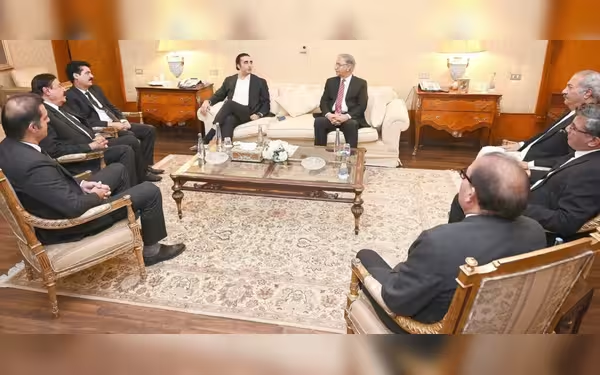Saturday, November 16, 2024 04:38 PM
PPP Chairman Bilawal Bhutto Zardari Advocates for Constitutional Courts in Pakistan
- Bilawal supports establishment of constitutional courts.
- Concerns raised over age of judges and favoritism.
- PPP opposes military courts, calls for parliamentary consensus.
 Image Credits: thefrontierpost
Image Credits: thefrontierpostBilawal Bhutto Zardari of PPP supports constitutional courts, raises concerns on judges' age, and opposes military courts in Pakistan.
In a significant development for Pakistan's legal landscape, the Chairman of the Pakistan Peoples Party (PPP), Bilawal Bhutto Zardari, has expressed strong support for the establishment of constitutional courts. This announcement came during a meeting held at Zardari House in Islamabad, where Bilawal convened the Provincial Presidents of the Peoples Lawyers’ Forum (PLF) to discuss proposed constitutional amendments.
The meeting saw the participation of key figures, including the Central President of PLF, Syed Nayyer Hussain Bokhari, and other prominent members from various provinces. The discussions primarily revolved around the proposed amendments to the Constitution, with a particular focus on the establishment of constitutional courts, a move that aligns with the PPP's Charter of Democracy and its manifesto.
Bilawal emphasized that the PPP is firmly in favor of these constitutional courts, which are intended to enhance the judicial framework of the country. However, he noted that the party did not engage in discussions regarding the age of judges in the proposed amendments, a topic that the government has shown interest in altering. The government has proposed reducing the age for judges at the time of appointment, a suggestion that the PPP has supported. Conversely, the government also suggested increasing the retirement age for the Chief Justice to 67 years, a proposal that faced opposition from the Jamiat Ulema-i-Islam, which advocated for maintaining the retirement age at 65.
Bilawal articulated concerns that changes to the age of judges could create a perception of favoritism, suggesting that it might appear as though certain individuals are being favored over others, which is not conducive to a fair judicial system. He also expressed his belief that Justice Mansoor Ali Shah is likely to be the next Chief Justice, highlighting the respect he holds for both Justice Shah and Justice Qazi Faez Essa, who were part of the bench that delivered the historic ruling on the murder of Shaheed Zulfikar Ali Bhutto.
Furthermore, Bilawal reiterated the PPP's principled stance against military courts, asserting that if the government intends to legislate on this matter, it should convene a joint session of the National Assembly and the Senate to discuss national security comprehensively. He also addressed the controversial Article 63-A, which he believes has unjustly stripped Parliament members of their right to vote according to their conscience. He argued that members should be allowed to express their votes freely, as was the norm in the past.
In his appearances on various television channels, Bilawal reiterated that the draft of the constitutional amendments currently circulating is not the authentic version. He stressed the importance of advancing the reforms promised in the PPP's manifesto and achieving a consensus among political allies, particularly with Maulana Fazlur Rehman, to ensure the proposed changes are well-received and effective.
The discussions led by Bilawal Bhutto Zardari reflect a critical moment in Pakistan's political and judicial evolution. The establishment of constitutional courts could potentially reshape the legal framework, ensuring a more robust and fair judicial process. As the PPP continues to advocate for reforms, the need for consensus and collaboration among political factions remains paramount. The future of Pakistan's judiciary may very well depend on the successful navigation of these complex discussions, highlighting the importance of unity in addressing the nation's legal challenges.













